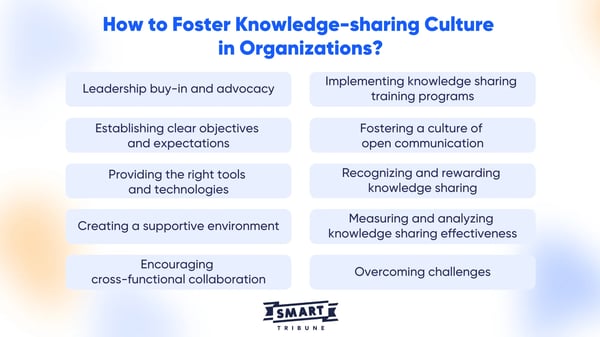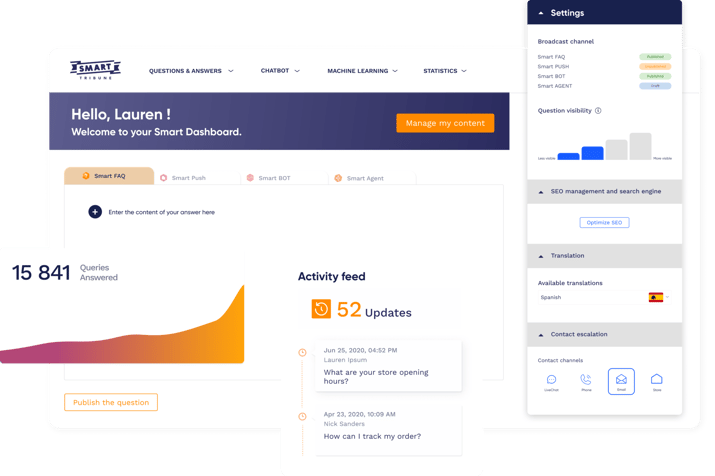
On NOVEMBER 22, 2023
10 Steps to Improve Knowledge Sharing Across Your Organisation
"Alone, we can do so little; together, we can do so much," echoes Helen Keller, capturing the essence of a culture where insights flow freely. With this spirit in mind, Smart Tribune strongly believes that knowledge sharing in the workplace should be a tactical primer for organisations to close knowledge gaps, drive innovation and remain at the forefront.
Understanding the significance of knowledge spreading, in this article, we will walk you through
- Knowledge sharing definition,
- Knowledge sharing levels,
- Steps to foster knowledge sharing culture,
- Enormous benefits of knowledge sharing,
- Knowledge sharing examples,
- Frequently asked questions about knowledge sharing.
Let's get the ball rolling!
What is Knowledge Sharing in the Workplace
Knowledge sharing in the workplace is the process of employees and team members openly and willingly sharing their expertise, insights, information, and experiences with their colleagues. It encompasses the transfer of explicit knowledge, implicit knowledge and tacit knowledge to help improve individual and collective performance.
Uncover the basics of knowledge transfer.

Common Knowledge Sharing Levels
In the context of knowledge sharing in the workplace, there are various levels that describe the nature and accessibility of information. These common knowledge sharing levels include explicit knowledge, implicit knowledge and tacit knowledge. Dive deep into their differences in the table below:
|
Knowledge sharing levels |
Description |
|
Explicit knowledge |
Information that is easily codified, documented, and transferable in a formalized manner. Examples include manuals, reports, and procedures. |
|
Implicit knowledge |
Practical know-how and skills that individuals possess but may find challenging to express explicitly. Shared through hands-on training, mentorship, and direct experience. |
|
Tacit knowledge |
Deeply rooted in an individual's insights, perspectives, and personal experiences. Challenging to formalize and articulate, often residing in intuition, beliefs, and cultural context. Shared through direct interaction and collaboration. |
How to Foster Knowledge-sharing Culture in Organizations?
In the fast-paced landscape of modern business, fostering a culture of knowledge sharing is regarded as a strategic imperative for organizations aiming to stay agile and competitive. Let's find out knowledge sharing best practices across the workplace.
Leadership buy-in and advocacy
Cultivating a knowledge-sharing culture starts at the top. C-level executives and leaders must champion the cause and actively demonstrate their commitment to sharing information.
When leaders prioritise knowledge sharing, it sends a clear message throughout the organization that collaboration and learning are not just encouraged but essential. This commitment should be reflected in both words and actions, creating a top-down momentum that permeates every level.
Establishing clear objectives and expectations
To build a successful knowledge-sharing culture, organizations need to define clear objectives and set expectations.
Leaders should articulate the value of knowledge sharing in achieving broader organizational goals. Whether it's accelerating innovation, improving customer satisfaction, or increasing operational efficiency, aligning knowledge-sharing efforts with strategic objectives provides a clear purpose and direction.
Providing the right tools and technologies
A knowledge-sharing culture thrives when supported by the right tools and technologies. Investing in user-friendly knowledge sharing platforms that facilitate seamless information exchange, collaboration, and document sharing is paramount important.
Cloud-based platforms, internal communication tools, and project management systems can play a pivotal role in breaking down knowledge silos and making knowledge easily accessible across the organization.
Besides, as technology evolves, so should knowledge-sharing practices. Organizations must stay abreast of technological advancements and be willing to adopt new tools and methodologies that enhance knowledge sharing. From AI-driven knowledge management systems to immersive virtual collaboration platforms, leveraging cutting-edge technologies can take knowledge sharing to new heights.
Smart Tribune is the ideal choice for your brand. We provide businesses with a complete suite of 360° AI-powered automated customer service software and a knowledge management platform that assists users in gaining and sharing information and knowledge with ease.
Demystify knowledge management with our insightful articles:
- What is knowledge management?
- The basics of creating and managing a knowledge base
- How to develop a knowledge management framework that benefits your business?
Creating a supportive environment
People are more likely to share their knowledge in an environment where they feel supported and valued.
Organizations should foster a culture that celebrates learning, recognizes contributions, and encourages curiosity. This involves promoting a growth mindset that views challenges as opportunities to learn and improve. Recognition programs, both formal and informal, can go a long way in acknowledging and appreciating individuals who actively contribute to the knowledge-sharing culture.
Encouraging cross-functional collaboration
Silos are the antithesis of knowledge sharing. Breaking down departmental barriers and encouraging cross-functional collaboration is crucial. Leaders should create opportunities for teams from different departments to collaborate on projects, share insights, and learn from each other.
Implementing knowledge sharing training programs
Not everyone may instinctively know how to effectively share knowledge. Providing training programs that teach employees the art of knowledge sharing, including communication skills, documentation techniques, and the use of collaboration tools, can bridge this gap.
These programs should be designed to be accessible and applicable to employees at all levels, from entry-level staff to top executives.
Find out How to use a knowledge base for financial compliance?
Fostering a culture of open communication
Effective knowledge sharing requires open communication channels. Leaders should encourage open discussions, feedback loops, and regular check-ins to ensure that information flows freely within the organization.
An open communication culture not only facilitates knowledge sharing but also enhances overall transparency and employee engagement.
Recognizing and rewarding knowledge sharing
Acknowledging and rewarding employees for their knowledge-sharing efforts is a powerful motivator. Recognition can take various forms, from an appreciation letter to public appreciation in team meetings or even more formalized reward programs.
By attaching value to knowledge sharing, organizations reinforce the behavior they want to promote, creating a positive feedback loop that encourages continuous collaboration.
Measuring and analyzing knowledge sharing effectiveness
To ensure the sustainability and impact of a knowledge-sharing culture, organizations need to measure and analyze its effectiveness. This involves tracking key performance indicators related to knowledge sharing, such as
- Frequency of information exchange,
- Knowledge retention,
- Accessibility of shared knowledge,
- Impact on project outcomes.
Regular assessments provide insights into areas that require improvement and help refine knowledge-sharing strategies.
Overcoming challenges
Implementing a knowledge-sharing culture is not without its challenges. Resistance to change, fear of information misuse, and time constraints are common obstacles. Organizations should proactively address these challenges by
- Communicating the benefits,
- Addressing concerns,
- Integrating knowledge sharing into existing workflows.
Overcoming resistance requires a combination of effective communication, ongoing training, and visible leadership support.
The Importance of Knowledge Sharing in Organizations?
Cultivating a culture of knowledge sharing within the workplace isn't merely a corporate ideal—it's a strategic imperative with far-reaching benefits for staff, customers, and the overall business ecosystem. Let's discover the benefits of knowledge sharing!

Empowering staff: Nurturing professional growth
Knowledge sharing serves as a cornerstone for staff empowerment, unlocking avenues for continuous learning and skill enhancement.
By fostering an environment where insights and experiences are freely exchanged, staff members gain access to a collective pool of wisdom. This not only accelerates their professional development but also instills a sense of accomplishment and job satisfaction.
The recognition of individual contributions in a knowledge-sharing culture becomes a powerful motivator, propelling staff members toward greater heights in their careers.
Elevating collaboration: Strengthening team dynamics
Knowledge sharing breaks down silos and fosters a collaborative ethos within teams. As staff members actively exchange information, they contribute to a collective intelligence that transcends individual capabilities. This synergy enhances teamwork and camaraderie, creating an environment where the whole is truly greater than the sum of its parts.
Businesses, fueled by collaborative staff interactions, experience heightened creativity, improved project outcomes, and an organizational culture that values collective success.
Adaptability in the face of change: A strategic advantage for businesses
In an era of constant change, businesses must be agile and adaptive to stay competitive. Knowledge sharing ensures that staff members remain informed about industry trends, emerging technologies, and best practices. This continuous learning not only equips individuals for personal growth but also positions businesses strategically. An organization that embraces knowledge sharing is inherently more resilient, ready to navigate industry shifts and seize new opportunities as they arise.
Customer experience enhancement: A cornerstone of business success
Customers today seek more than just products or services; they crave experiences.
Knowledge sharing plays a pivotal role in crafting exceptional customer experiences. Informed and empowered staff members are better equipped to understand customer needs, provide relevant information, and offer personalised solutions.
The heightened level of customer service not only fosters loyalty but also acts as a competitive differentiator, setting businesses apart in a crowded marketplace.
Driving innovation: A business imperative
At the heart of every successful business is innovation, and knowledge sharing is its lifeblood.
When staff members share their insights and ideas, it sparks creativity and innovation across the organization. Businesses that actively encourage knowledge sharing become hubs of inventive thinking, driving the development of new products, services, and processes. This innovation isn't just a buzzword; it's a fundamental element that propels businesses forward in the ever-evolving global landscape.
Examples of Knowledge Sharing
1. "Lunch and Learn" sessions
Imagine a company where employees come together over lunch to share knowledge with team members in an informal setting. These "Lunch and Learn" sessions provide staff with the opportunity to present on topics they are passionate about or share insights from recent projects.
This not only cultivates a sense of community but also allows employees to learn from each other's experiences in a relaxed and engaging environment. Whether it's a tech demo, a project debrief, or a skill-sharing session, these gatherings inspire a culture of knowledge sharing that goes beyond traditional formalities.
2. Digital knowledge repositories
In a tech-savvy workplace, imagine a shared digital space or a knowledge sharing platform, such as Smart Knowledge where employees can contribute and access a wealth of resources.
Smart Knowledge serves as a centralised hub for documents, best practices, and tutorials.
Whether it's a how-to guide for internal tools or a repository of successful project templates, this easily accessible knowledge management platform encourages staff to share their expertise.
This not only streamlines processes but also ensures that valuable knowledge is readily available to all, promoting a culture where information is a shared asset.
Look over the guide, tips and templates for effective knowledge base article.
Over 150 international brands place faith in Smart Knowledge - the #1 internal knowledge base solution in France to leverage the power of knowledge in the workplace. Now, it's your turn to book a demo and take the big leap.

3. Cross-departmental collaborative projects
Picture a scenario where employees from different departments collaborate on projects that extend beyond their usual roles. These cross-departmental projects stimulate the exchange of skills and insights, which eventually break down silos and foster a holistic understanding of the business.
Whether it's marketing collaborating with product development or sales working closely with customer support, these projects become breeding grounds for knowledge sharing. As employees contribute their unique perspectives, the organization benefits from a more comprehensive approach to problem-solving and innovation.
Incorporating these examples into the workplace not only makes knowledge sharing more tangible but also infuses a sense of excitement and collaboration among employees. These initiatives demonstrate that knowledge sharing doesn't have to be a complex or formal process; it can be as simple as sharing a meal, maintaining a digital knowledge hub, or working together on cross-functional projects. By embracing these approaches, businesses can inspire a culture where the exchange of knowledge becomes a natural and integral part of day-to-day operations.
FAQs about Knowledge Sharing
1. What is knowledge sharing?
Knowledge sharing is the process of exchanging information, insights, and expertise among individuals or groups within an organization, fostering a collaborative environment that enhances learning and problem-solving.
2. Why knowledge sharing is important?
Knowledge sharing is important because it accelerates innovation, improves problem-solving, enhances decision-making, and fosters a culture of continuous learning within organizations. It enables individuals and teams to leverage collective expertise, leading to increased efficiency, adaptability, and overall success in a rapidly changing business landscape.
3. What are catchy names for knowledge sharing sessions?
Some fun and catchy names you can opt for your knowledge sharing sessions are
- Brainwaves Exchange
- Wisdom Circles
- Knowledge Huddles
- Insight Ignition Sessions
- Learn-a-Palooza
- Mindsync Meetups
- Ideas Oasis
- Knowledge Carnival
- InnoShare Sessions
- SmartTalk Series
- CollabConnect Conversations
- InfoSphere Exchanges
- Insightful Brews
- ThinkTank Thursdays
- Knowledge Jam
- Learnovation Lounge
- Ideas Fiesta
- MindMingle Moments
- InnoSpark Sessions
- Wisdom Waves Cafe
4. What are knowledge sharing quotes?
Quotes that can inspire your team to share information, knowledge and expertise:
- "Knowledge shared is knowledge multiplied."
- "In the world of business, knowledge is the new currency, and sharing is the key to its value."
- "Alone, we can do so little; together, we can do so much."
- "The beautiful thing about learning is that no one can take it away from you."
- "Knowledge is power, but knowledge shared is empowerment."
- "A candle loses nothing by lighting another candle."
- "Great things in business are never done by one person; they're done by a team of people."
- "The only thing to do with good advice is to pass it on. It is never of any use to oneself."
- "The more you share, the more you learn. The more you learn, the more you grow."
- "Sharing knowledge is not about giving people something, or getting something from them. That is only valid for information sharing. Sharing knowledge occurs when people are genuinely interested in helping one another develop new capacities for action; it is about creating learning processes."
Final Thoughts on Expertise Sharing
Apparently, the transformative impact of knowledge sharing in the workplace cannot be overstated. As teams embrace a culture where insights flow freely, we witness not just the growth of individuals but the flourishing of entire organizations. In this narrative of collaborative success, the adoption of internal knowledge base solutions emerges as a pivotal game-changer.
Smart Knowledge, with its powerful features and seamless integration, propels us into a future where information isn't just stored—it's harnessed strategically for innovation and collective brilliance.
It's been a long journey to discover the core of knowledge sharing within organisation! Should you have any further inquiries or give Smart Knowledge a whirl, drop us a line for assistance.


.png)



